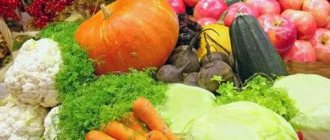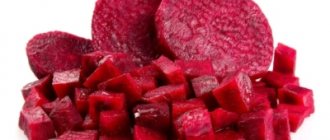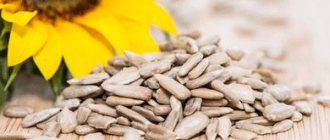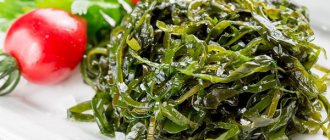Treatment of diseases of the gastrointestinal tract begins with the introduction of a strict diet, which requires the exclusion of all foods that can cause irritation of the mucous membrane of the tract and an increase in hydrochloric acid in the gastric juice, which will make it more aggressive.
If you have an ulcer, most fruits are prohibited because they contribute to gas formation and an increase in hydrochloric acid in the gastric juice. But where then can we get the necessary vitamins and microelements? During the melon season, people often ask whether it is possible to eat watermelon if you have a stomach ulcer, because the berry is not sour and should not increase the pH of gastric juice.
To understand whether it is possible to eat ripe watermelon if you have a stomach ulcer, you need to understand what substances are in the berry and how they affect the digestive system and the body as a whole.
The benefits and harms of watermelon
Watermelon pulp has a powerful healing effect on the human body due to its rich chemical composition:
- The amino acid L-citrulline prevents muscle pain after hard workouts in the gym. Those who drank a glass of fresh watermelon before class noted a decrease in pain within a day.
- Vitamin A has a beneficial effect on vision.
- The substances arginine and citrulline reduce blood pressure and the risk of cardiovascular diseases.
- Fiber normalizes digestion and eliminates spasms in the gallbladder.
- High diuretic activity helps cleanse urine and reduce oxalates in the kidneys.
- Arginine improves erectile function.
- Lycopene reduces the risk of developing ovarian cancer in women during menopause.
- Watermelon pulp increases skin elasticity, moisturizes and prolongs youth.
- In the kidneys, citrulline is synthesized into the amino acid arginine, which supports the body's defenses and improves the functioning of the heart muscle.
- Lycopene has antioxidant properties and prevents the development of cancer cells.
The harmful effects of watermelon on the body develop with excessive consumption and combination with heavy foods. Instead of digestion, food begins to ferment in the stomach, which leads to unpleasant sensations (diarrhea, bloating, heartburn) and disruption of the gastrointestinal tract.
Composition of watermelon
Watermelon contains the following useful components:
- Carbohydrates. They are represented by starch, fructose and glucose; during long-term storage, sucrose is formed in the berry. These carbohydrates are easily absorbed by the body and charge cells with the necessary energy.
- Squirrels. They supply cells with essential amino acids that cannot be synthesized in the human body. The resulting amino acids are broken down to release energy or used for the biosynthesis of their own proteins.
- Cellulose. These complex carbohydrates help maintain the normal composition of intestinal microflora, fight inflammatory processes, and reduce the risk of cancer. Pectin also belongs to soluble fiber. They are almost not absorbed in the human body, but are enterosorbents, that is, they remove exogenous and endogenous substances from the gastrointestinal tract.
Watermelon has almost no contraindications for consumption
The list of substances included in the product continues:
- Vitamin C, P, A and group B. Vitamin C is an antioxidant, important for the formation of collagen, serotonin, catecholamines and corticosteroids. In addition, ascorbic acid stimulates the synthesis of interferon, which helps fight viral agents. B vitamins ensure the occurrence of many biochemical processes in the human body. Carotene is an antioxidant, stimulates the immune system and has an adaptogenic effect.
- Microelements. Contains magnesium, calcium, sodium, potassium, phosphorus and iron. They are necessary for the normal functioning of the body, since they affect the digestive, cardiovascular, and endocrine systems, and are required for the normal functioning of the hematopoietic organs.
- Organic acids. Positively affect metabolism and digestive system.
- Lycopene. Is an antioxidant. Removes radicals from tissues, thereby preventing the formation of cancer cells, and prevents the development of cardiovascular diseases. In addition, it protects the retina, lens and macula from photon damage.
Is it possible to eat watermelon if you have stomach and duodenal ulcers?
Gastric and duodenal ulcers are local lesions of the mucous membrane formed under the influence of the gram-negative bacterium Helicobacter pylori. This is a dangerous condition that aggravates the reflux of bile into the stomach and provokes the production of hydrochloric acid. Without treatment, internal bleeding develops or, worse, a through hole appears.
After identifying the disease, doctors prescribe appropriate treatment and diet , without which full recovery is impossible. During this period, foods that cause irritation to the walls of the intestines and stomach are prohibited. This list also includes melon crops such as melon and watermelon.
Doctors are of the opinion that it is better to avoid eating watermelon during an exacerbation of the disease . It is allowed to gradually return to the diet in the remission stage, starting with small portions.
Points for and against
Let's start with the arguments against watermelon in the acute period of the disease :
- The pulp contains a lot of vitamin C (7 mg per 100 g), which has an irritating effect on the gastric mucosa and provokes bleeding.
- The product promotes the production of hydrochloric acid, which causes a chemical burn of the walls of the digestive tract, aggravating the course of the disease.
- Watermelon increases the acidity of the stomach, causing discomfort (pain, heartburn).
- The pulp is prohibited due to fiber, which injures the intestinal walls.
- A stomach ulcer is accompanied by diarrhea, and the strong diuretic effect of the product contributes to the intensification of the unpleasant phenomenon. This leads to dehydration and increases the risk of relapse.
May be useful:
What are the benefits of watermelon juice and how to prepare it
Do watermelons ripen when picked?
How to understand that a watermelon has gone bad and what to do
It is advisable to talk about the positive effect of watermelon on the body during ulcers when the disease has gone into remission. Even a small amount of pulp will help:
- strengthen the immune system thanks to the same vitamin C;
- strengthen capillaries and blood vessels;
- remove toxins;
- eliminate bleeding gums;
- improve complexion;
- replenish potassium reserves and improve heart function;
- remove excess fluid from subcutaneous fat.
How does watermelon affect the digestive system?
Thanks to this composition, watermelon has a diuretic, choleretic, anti-inflammatory, antipyretic, laxative, and tonic effect. The berry helps strengthen the walls of blood vessels, which prevents thrombosis, and enhances intestinal motility, which helps cleanse the gastrointestinal tract and cope with constipation.
Since the berry is a natural laxative (due to its fiber content), it prevents the formation of stones and the deposition of salts.
Despite all the beneficial properties, it is still not recommended to consume the berry in unlimited quantities for stomach or intestinal ulcers. There are several reasons for this. Watermelon has the ability to accumulate nitrates, and their excess can lead to serious poisoning not only for people with gastrointestinal problems, but also for healthy ones.
If the fruit appeared on store shelves outside the ripening season, then there is a high probability that it was “fed” with fertilizers. Watermelon ripens in August-September, and it is at this time of year that the berry can be eaten. You should not buy overripe watermelons.
When consuming watermelon, skin color improves, bleeding gums go away, and excess fluid is removed from the body.
The fiber contained in the berry can increase the inflammatory process because it has a mechanical effect on the walls of the digestive tract. And this provokes an exacerbation of pathological processes.
Aloe with honey to treat stomach
In the stomach, watermelon pulp stimulates the secretion of hydrochloric acid. With this pathology, wounds (ulcers) form on the mucous tissue of the stomach and duodenum. When acid touches the affected area, it causes burns and severe pain.
A large amount of juicy pulp (more than 1.5–2 kg) leads to digestive system upset. This applies to both people with gastrointestinal pathology and healthy people. There is discomfort in the stomach, bloating and stool disturbances.
Ascorbic acid causes a chemical burn to the affected area. As a result, the lesion increases, and the person feels severe pain in the place where there is damage to the organ wall. If there is too much acid, it can cause bleeding from the ulcer.
It is undesirable for people with peptic ulcers to eat foods that have a diuretic effect, since the pathology is already characterized by weak stools. Frequent urination and insufficient drinking can lead to dehydration of the mucous membrane, which will lead to an exacerbation of the disease.
Watermelon for exacerbation of ulcers
During the period of exacerbation of stomach and duodenal ulcers, patients go on a strict diet that excludes the consumption of fruits, berries, and raw vegetables. That is, products containing coarse fiber that can injure the affected mucous membrane. All food should be boiled, steamed or crushed. No hot sauces, fried or overly fatty foods, or foods marinated in vinegar.
Watermelon is included in the list of prohibited foods due to its high content of ascorbic acid and fiber, and the ability to increase stomach acidity. If you have a duodenal ulcer, you can drink watermelon juice diluted with water, but you should not eat the pulp.
In chronic form
During the period of remission, berries can be returned to the diet no earlier than six months after completion of the main treatment. During this time, the tissues of the intestines and stomach will have time to fully recover. The decision on the possibility of introducing non-acidic berries and fruits into the diet is made by a gastroenterologist after assessing the condition of the mucous membrane.
If the pain returns, you will have to stop eating watermelon pulp.
Useful qualities of melons
Watermelon has a number of beneficial properties. The pulp of melons is rich in ascorbic acid, which helps increase the immune response and prevent infectious diseases. Substances contained in watermelon strengthen capillaries, remove toxic substances, and prevent blood clots.
- Regular consumption of large berries helps stop bleeding gums and improve complexion. The skin becomes fresh and elastic. Watermelon is rich in potassium; eating 100 grams of the product daily will improve your heart condition.
- For people with an increased tendency to edema, it is useful to include watermelon in their diet every day. The fruit is endowed with a high diuretic effect and ensures the removal of excess moisture from the subcutaneous tissue.
- A number of diets designed for weight loss include special fasting days, when you are allowed to eat only watermelon pulp. If you strictly adhere to the recommendations for the nature of your diet, it is quite possible to lose 2 kilograms of excess weight during a fasting day, while simultaneously cleansing the body of toxic substances.
Rules for use for ulcers
In order not to harm your health, doctors recommend adhering to the rules for consuming watermelons for ulcerative lesions of the gastrointestinal tract :
- Eat the product no more than twice a week.
- Discard early fruits harvested in early August. They contain a high content of nitrates.
- Pay attention to the color of the pulp. It should be dense, red or scarlet in color, without yellowness or white streaks.
- Do not consume the product immediately after taking it out of the refrigerator. Cold food irritates the mucous membranes.
- Eat watermelons during the period when the symptoms of the disease subside and only as a dessert, after the main course.
- Do not swallow watermelon seeds.
Standards of use
For stomach and duodenal ulcers in remission, the daily intake is 150-300 g. Doctors recommend dividing this amount into two doses to understand how the body will react.
How to avoid exacerbation of the disease
To minimize the risk of irritation of the mucous membrane and exacerbation of peptic ulcer disease, you should adhere to the following recommendations:
- You can eat no more than 300 grams of watermelon per day. It is better to divide the indicated amount into 2-3 doses, so as not to cause excessive production of hydrochloric acid and tissue irritation with fiber;
- It is not allowed to eat watermelon that appeared earlier than the season. Such fruits will not please you with their taste and will not bring benefits to the body, but they are quite capable of causing digestive upset;
- You can eat berries no more than twice a week;
- Eating watermelon is allowed only after meals;
- Although watermelon seeds have beneficial properties, they are more likely to cause harm in case of a peptic ulcer, so it is not recommended to swallow them;
- watermelon should not be too cold, since cold food negatively affects the mucous membrane of the esophagus and stomach;
- Since the berry is seasonal, trying to preserve it for the winter, people figured out how to pickle it. The patient should abstain from canned watermelons.
Contraindications and precautions
Doctors recommend using the product with caution :
- with type 2 diabetes due to large amounts of fructose;
- in cases of renal dysfunction due to diuretic effects;
- if there is a violation of the outflow of urine;
- with pyelonephritis;
- for ulcerative lesions of the gastrointestinal tract in the stage of subsiding symptoms.
You will have to completely abandon the product if ulcer symptoms increase during the acute period of the disease.
Reference. Watermelon pulp should not be given to children under one year of age due to the risk of bloating.
What is the benefit
Few people know about all the properties of melons. The high content of vitamin C does an excellent job of preventing infections and makes the walls of blood vessels stronger, and also prevents the formation of blood clots. But this is not all the advantages.
- By enjoying the delicate taste throughout the season, you will be able to get rid of bleeding gums and get a healthy complexion.
- Potassium contained in watermelon improves heart function.
- The well-known diuretic abilities of the fruit will solve the problem of edema and remove excess fluid from the body.
- Fasting days, when you eat only the aromatic and juicy pulp of watermelon, will undoubtedly help you lose weight and cleanse your body.
But with all the advantages of the berry, there are also disadvantages. Nitrates are the other side of the coin. Nowadays, many food products are filled with these kinds of chemicals, and this is undoubtedly dangerous to health. This circumstance makes your favorite treat harmful.
Feel free to use only when you are sure that the melons are grown naturally. And if you have even the slightest doubt about the natural origin, it’s better not to risk it.
Another way to somehow reduce the risk of watermelon poisoning is to buy it at the end of summer. During this period, they ripen naturally, and there is no need to feed them with chemicals. Thus, there is a chance to please yourself, receiving pleasure and benefit at the same time.











